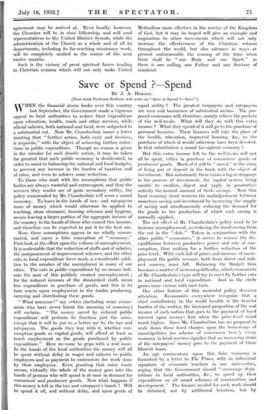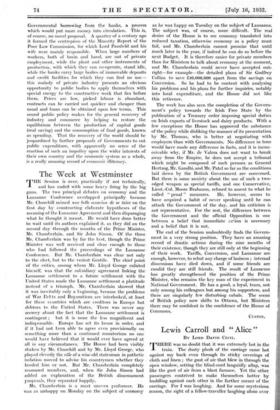Save or Spend ?—Spend
By J. A. HOBSON.
[Next week Professor Robbins will write on " Save or Spend t—Save."1
WHEN the financial storm broke over this country last September, the Government made a vigorous appeal to local authorities to reduce their expenditure upon education, health, roads and other services, while official salaries, both national and local, were subjected to a substantial cut. Now Mr. Chamberlain issues a letter insisting that " further action, both early and decisive, is requisite," with the object of achieving further reduc- tions in public expenditure. Though no reason is given in the circular for such drastic action, it may be taken for granted that such public economy is desiderated, in order to assist in balancing the national and local budgets, to prevent any increase in the burden of taxation and of rates, and even to achieve some reduction.
To those who start with the assumptions that public bodies are always wasteful and extravagant, and that the services they render are of quite secondary utility, the policy commended by Mr. Chamberlain will seem a sound economy. To leave in the hands of tax- and ratepayers sums of money which would otherwise be applied to teaching, slum clearance, housing schemes and hygiene, means leaving a larger portion of the aggregate income of the country in the hands of those who earned this income, and therefore can be expected to put it to the best use.
Now, these assumptions appear to me wholly unwar- ranted, and carry a false conception of " economy." First look at the effect upon the volume of unemployment. It is undeniable that the reduction of staffs and of salaries, the postponement of improvement schemes, and the other cuts in local expenditure have made a considerable addi-. tion to the number of the unemployed in many of our cities. The cuts in public expenditure by no means indi- cate the sum of this publicly created unemployment ; for the reduced incomes of the diminished staffs mean less expenditure in purchase of goods, and this in its turn reacts upon employment in the trades producing, carrying and distributing these goods.
" What nonsense !" my critics (including some econo- mists who have never learnt the meaning of economy) will exclaim. " The money saved by reduced public expenditure will perform its function just the same, except that it will be put to a better use by the tax and ratepayers. The goods they buy with it, whether con- sumption goods or capital goods, will afford at least as much employment as the goods purchased by public expenditure." Here we come to grips with a real issue. In the hands of the local authorities the money will all be spent without delay in wages and salaries to public employees and as payment to contractors for work done by their employees. Even granting that some waste occurs, virtually the whole of the money goes into the hands of persons who will spend it at once in demand for consumers' and producers' goods. Now what happens if this money is left in the tax and ratepayer's hands ? Will he spend it all, and without delay, and upon goods of equal utility ? The greatest taxpayers and ratepayers are men and businesses of substantial means. The pro- posed economies will, therefore, mainly relieve the pockets of the well-to-do. What will they do with this extra income ? What they spend of it will go to the purchase of personal luxuries. These luxuries will take the place of the health, education, improved housing, &c., to the purchase of which it would otherwise have been devoted. Is that substitution a sound far-sighted economy ?
But this extra income left to the well-to-do will not all be spent, either in purchase of consumers' goods or producers' goods. Much of it will be " saved," in the sense of being put at deposit in the bank with the object of investment. But notoriously there exists a lag or stoppage in the process of investment, the capital system being unable to swallow, digest and apply in productive activity the normal amount of fresh savings. Now this local economy stunt worsens the maladjustment between monetary saving and investment by increasing the supply of saving and simultaneously reducing the demand for the goods to the production of which such saving is normally applied.
The net effect of Mr. Chamberlain's policy must be to increase unemployment, so reducing the fiscal saving from the cut in the " dole." Taken in conjunction with the other public " economies," it serves to worsen the dis- equilibrium between productive power and rate of con- sumption, thus making for a further reduction of the price level. With each fall of prices and increase of unem- ployment the public revenue, both from direct and indi- rect sources, must fall. Balancing the Budget thus becomes a matter of increasing difficulty, which economists of Mr. Chamberlain's type will try to meet by further cuts in national and local expenditure. And so the circle grows more vicious with each turn.
One other feature of this mournful policy deserves attention. Economists everywhere recognize that a chief contributory to the world trouble is the heavier burden of the rentier, the increased proportion of the real income of each nation that goes to the payment of fixed interest upon moneys lent when the price-level stood much higher. Since Mr. Chamberlain has no proposal to Scale down these fixed charges upon the borrowings of municipalities (no scheme of conversion here !) every economy in local services signifies that an increasing share of the ratepayers' money goes to the payment of these bloated loans.
An apt commentary upon this false economy is furnished by a letter to The Times, with an influential signature of economic teachers in our universities, urging that the GovernMent should " encourage depu- tations to local authorities, &e., to speed up their expenditure on all sound schemes of construction and development." The finance needed for such work should be obtained, not by additional taxation, but by Governmental borrowing from the banks, a process which would put more money into circulation. This is, of course, no novel proposal. A quarter of a century ago it formed the centrepiece of the Minority Report of the Poor Law Commission, for which Lord Passfield and his wife were mainly responsible. When large numbers of workers, both of brain and hand, are out of private employment, while the plant and other instruments of production, with which they can co-operate, stand idle, while the banks carry large bodies of immovable deposits and credit facilities for which they can find no use— this malady of private industry presents an obvious opportunity to public bodies to apply themselves with special energy to the constructive work that lies before them. Prices are low, picked labour is abundant, contracts can be carried out quicker and cheaper than usual and loans can be obtained upon low terms. This' sound public policy makes for the general recovery of industry and commerce by helping to restore the equilibrium between the production of capital goods (real saving) and the consumption of final goods, known as spending. That the recovery of the world should be jeopardized by further proposals of Governments to cut public expenditure, with apparently no sense of the reaction of such an impolicy upon the wider interests of their own country and the economic system as a whole, is a really amazing record of economic illiteracy.



































 Previous page
Previous page